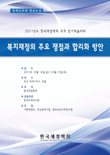학술논문
What Changes the Effects of Fiscal Policy? A Case Study of Japan
이용수 27
- 영문명
- 발행기관
- 한국재정학회(구 한국재정·공공경제학회)
- 저자명
- Keigo KAMEDA
- 간행물 정보
- 『한국재정학회 학술대회 논문집』2011년도 추계학술대회 논문집, 1~23쪽, 전체 23쪽
- 주제분류
- 경제경영 > 경제학
- 파일형태
- 발행일자
- 2011.10.30
5,560원
구매일시로부터 72시간 이내에 다운로드 가능합니다.
이 학술논문 정보는 (주)교보문고와 각 발행기관 사이에 저작물 이용 계약이 체결된 것으로, 교보문고를 통해 제공되고 있습니다.

국문 초록
영문 초록
In the past two decades, the Japanese government has spent a considerable amount of money to counteract the deep recessions that have recurred since 1992. Many studies have pointed out that the effects of these expenditures have diminished since around the 1990s. None of these studies, however, have statistically tested the reasons for this diminution, which they implicitly or explicitly mention. The purpose of this study is to statistically test these reasons, using a threshold VAR in which the causes pointed out in the literature are adopted as the threshold. If the null hypothesis that the estimated parameters are equal under each regime is rejected, we can say that a given cause does affect the structure of the macro economy, and then the effects of fiscal policy. We then estimate the impulse response functions in both sample periods as constructed based upon the threshold estimates, and compare the effects of fiscal policy in each period.
The results of the study are as follows. First, we found that the diffusion index of the attitude of financial institutions toward lending and the yearly change in the annual average of the quarterly structural-primary-budget-balance-to-potential-GDP ratio rejects the null hypothesis to a significant degree; therefore, we considered that these variables have a definite impact upon the effects of fiscal expansion. Second, the resulting impulse response functions show that the effects are basically traditional, though there are some notable differences. In particular, a crowding-in of private investment is the result of banks’ relaxed attitude toward lending and the sound financial condition of the government. Finally, in bad times, the demand-enhancing effects of public investment should be considered to be weak. In this regard, non-interest rate channels of the crowding-out of private investment, excess accumulation of public capital, and non-Keynesian effects are the key operative concepts.
목차
Abstract
1. Introduction
2. Statistical Methodology and Data
3. Impulse Response Functions under Each Regime
4. Concluding Remarks
Data Appendix
References
키워드
해당간행물 수록 논문
- 기후변화 CGE 모형의 연산구조 차이에 따른 CO₂ 한계저감비용 변화에 관한 연구
- 21세기 공정거래와 국제경쟁시장의 논쟁과 고찰
- An Optimal Time-Consistent Taxation with Revenue and Debt Constraints
- Transmission Mechanisms of the Public Debt
- Fiscal Policy, Overconsumption and Sovereign Debt Crisis
- 지불거부 응답
- 정유사의 공급가 할인이 정유사ㆍ주유소 판매 가격에 미친 영향에 대한 실증적 연구
- Coalitional Manipulation on Networks
- 공적이전소득이 사적이전 소득에 미치는 영향분석
- 보육분야 정부보조금이 민간재원을 구축하는가?
- 복지 정책과 논쟁에 대한 근원적 고찰
- 저출산고령화와 경제성장률간 관계 연구
- 예산법률주의와 지방정부 예산전쟁
- 자동안정화장치의 경기안정화 효과 분석
- Public Investment and Regional Business Fluctuations in Japan
- What Changes the Effects of Fiscal Policy? A Case Study of Japan
- 유가가 소비자의 자동차 구매패턴에 미치는 영향에 관한 실증적 연구
- 전력시장 소매가격의 규제가 사회후생에 미치는 영향
- Optimal Fiscal Rules for Green Growth in an Endogenous Growth Model
- 근로장려세제(EITC) 개편방안 연구
- 세입담당 부처와 세출담당 부처의 통합과 분리에 관한 정치경제학적 분석
- 국가 공기업 재무건전성제고를 위한 대안
- 분권화와 경제성장
- The effect of Corporate Taxes on Firm Productivity
- 고령층 경제력 분포를 고려한 기초노령연금의 역할과 재편 방향
- 인플레이션과 이자소득세, 법인의 이자수입 및 지급이자 비용처리 문제에 대한 경제학적 접근
- 복지재정의 주요 쟁점과 합리화 방안
- 기부횟수 분석을 통한 기부성향의 분석
- 소득계층별 물가지수가 체감물가에 미치는 영향
- 인플레이션과 소득재분배
참고문헌
관련논문
경제경영 > 경제학분야 NEW
- Enhancing Indonesian Hotel Performance Through Distribution-Market Orientation and Value-Centric Innovation in Distribution
- Gemas: Enhancing the Distribution of Integrated Eco-Friendly Marketing Strategies towards Digital Transformation and Global Competitiveness
- An Expanded Website Quality Model in Online Shopping Malls for Developing Satisfaction and Loyalty: The Moderating Effect of Gender
최근 이용한 논문
교보eBook 첫 방문을 환영 합니다!

신규가입 혜택 지급이 완료 되었습니다.
바로 사용 가능한 교보e캐시 1,000원 (유효기간 7일)
지금 바로 교보eBook의 다양한 콘텐츠를 이용해 보세요!





